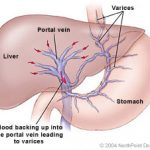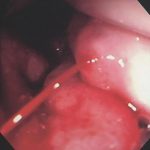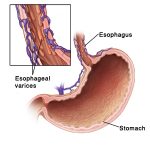Posts Tagged ‘portal hypertension’
What Is Ascites?
What is ascites? Ascites is the accumulation of fluid (usually serous fluid which is a pale yellow and clear fluid) that accumulates in the abdominal (peritoneal) cavity. The abdominal cavity is located below the chest cavity, separated from it by the diaphragm. Ascitic fluid can have many sources such as liver disease, cancers, congestive heart…
Read MoreWhat is Portal Hypertension?
Portal hypertension is an increase in the pressure within the portal vein (the vein that carries blood from the digestive organs to the liver). The increase in pressure is caused by a blockage in the blood flow through the liver. Increased pressure in the portal vein causes large veins (varices) to develop across the esophagus…
Read MoreWhat Are the Treatments for Portal Hypertension?
What Are the Treatments for Portal Hypertension? The portal vein carries blood from the gastrointestinal tract to the liver. If this vein becomes blocked by cirrhosis which is a scarring of the liver or by a blood clot the pressure inside the vein increases. This increase in pressure is called portal hypertension. When blood flow…
Read MoreUK guidelines on the management of variceal haemorrhage in cirrhotic patients
Management of Variceal Haemorrhage 1.0 Introduction These guidelines on the management of variceal haemorrhage were commissioned by the British Society of Gastroenterology under the auspices of the Liver Section. They were written in June 1998 and have been corrected and agreed upon by the members of the Liver Section. The nature of variceal haemorrhage in…
Read MoreEsophageal Varices
Esophageal Varices The portal vein carries approximately 1500 mL/min of blood from the small and large bowel, the spleen, and the stomach to the liver. Obstruction of portal venous flow, whatever the etiology, results in a rise in portal venous pressure. The response to increased venous pressure is the development of a collateral circulation diverting…
Read MoreThe role of TIPS in the management of portal hypertension
TIPS in the management of portal hypertension Transjugular intrahepatic portosystemic shunt (TIPS) is an interventional radiology technique that has shown a 90% success rate to decompress the portal circulation. As a non-surgical intervention, without requirement for anesthesia and very low procedure-related mortality, TIPS is applicable to severe cirrhotic patients, who are otherwise untreatable, for example,…
Read More




